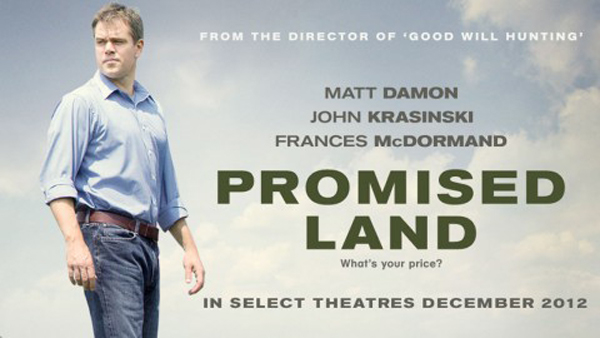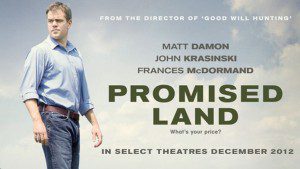
08 Jan TALL TALES: REVIEW OF “PROMISED LAND”
Editor’s note: Telluride Inside… and Out’s monthly column, Tall Tales, is so named because contributor Mark Stevens is one long drink of water. He is also long on talent. Mark is the author of “Antler Dust” and “Buried by the Roan,” both on the shelves of Telluride’s own Between the Covers Bookstore, 224 West Colorado Ave, Box 2129. He is also a former reporter (Denver Post, Christian Science Monitor, Rocky Mountain News) and television producer (MacNeil/Lehrer NewsHour) now working in public relations – and occasionally publishing wonderful books.
 “Promised Land” has its share of compelling moments and one big fat zinger of a plot twist at the end.
“Promised Land” has its share of compelling moments and one big fat zinger of a plot twist at the end.
You can find the spoiler elsewhere if you want to ruin a good movie, but I went right along and took everything at face value until the scene outside the motel when gas-and-fracking pitchman Steve Butler (Matt Damon) has his eyes opened—and so do we—to a whole new level of corporate arrogance and desperation.
Watching “Promised Land,” it was hard to not to think self-satisfying thoughts (such as: I think my mystery “Buried by the Roan” would make a much better premise for a movie script about fracking).
But “Promised Land” does one thing well: it shows the enormous choice facing the citizens of small-town America.
On one hand, take a pile of cash. The other, protect your land from the possibility, however remote, that deep-earth drilling and fracking will scar the landscape, consume precious water, damage the crops and livestock and forever change the way of life in your close-knit town, where the citizen assemblies and basketball practices happen in the same creaky gymnasium.
What “Promised Land” shows is that this is a real and high-stakes choice and that the choices are being made by individual circumstances—and not much more. One property owner rushes out to buy a fancy car before the lease revenues have even started to flow. Others feel so determined to keep things the way they are that they confront a mystified Steve Butler in the town bar and punch him in the nose.
Wise old teacher Frank Yates (played by Hal Holbrook) plays the thoughtful town sage, who leads (however modestly) the crusade to protect the town’s way of life. He seizes the momentum in the effort to challenge the gas industry’s claims that they can drill and do no harm—but precious few facts are discussed in the course of “Promised Land” about the consequences of fracking.
Yates’ chief accomplishment is to put Steve Butler on the spot and gain the emotional upper hand. He encourages citizens to “Google” the term fracking and one supposes that they all go home and get angry; there’s precious little on-screen debate about fracking.
In fact, if anything, “Promised Land” takes an even-keeled approach. The fact that the oil and gas industry is criticizing the film should tell you all you need to know about the final message (and the fact that Matt Damon mostly plays good guys).
But the “alarming” moments in “Promised Land” come from pictures of dead cows in another state and when environmental activist Dustin Noble (played by John Krasinksi) gives a demonstration of the fracking process using a model plastic farm in a school classroom. This classroom show includes a small fire, into which he threatens to place the class’s pet turtle.
“Promised Land” presents reasonable people having a reasonable discussion about a critical issue facing the country’s future. Damon’s portrayal of the befuddled Butler, who just can’t understand why anyone would turn down the cash, is nuanced. Butler tells the locals they can’t run their cars on “rainbows and happy thoughts” but also understands the importance of not over-paying for a cup of lemonade in a down-to-earth town. Butler is not a steamroller, just another corporate salesman who can’t quite compute the decision-making process of the locals.
As an environmental flick, “Promised Land” is no “Silkwood” or “Erin Brockavich.” It’s more genteel and humane. It’s hardly shrill.
Town by town, county by county and state by state, the decisions to allow more drilling and fracking are being made by real people with very real consequences to weigh.
What “Promised Land” suggests is that the towns in the crosshairs deserve an honest discussion and dialogue, not well-rehearsed promises from corporate America.



Sorry, the comment form is closed at this time.